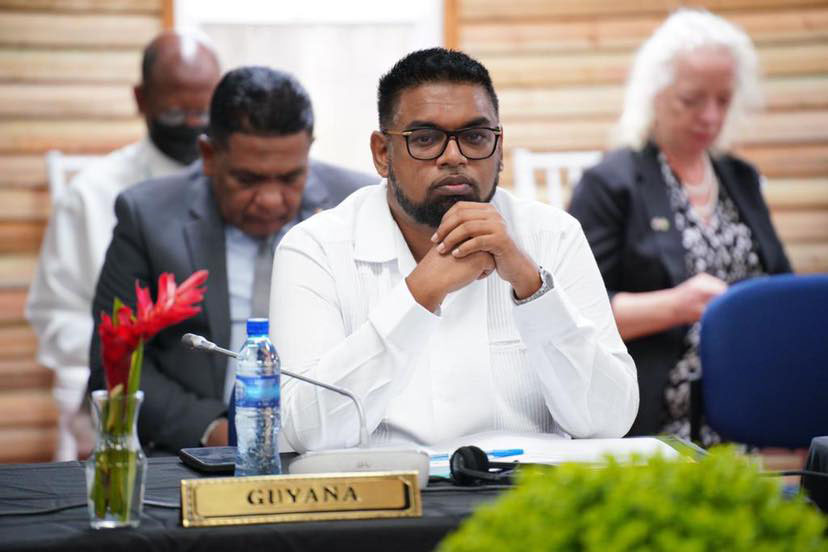Guyana’s President Irfaan Ali, who is tasked with leading the initiative to boost the Caribbean Community’s food security, told the CARICOM-SICA (Central American Integration System) Summit that the solution lies within enhanced regional cooperation.
The CARICOM-SICA summit opened yesterday in Belize following the conclusion of the 33rd inter-sessional meeting of CARICOM heads where Ali presented a detailed plan on increasing regional agricultural production and enhancing food security and sustainability.
“I wish to use this opportunity only to focus on one specific area and as the country with responsibility within CARICOM for agriculture and food security, I offer our readiness to collaborate with countries of the hemisphere to strengthen agri-food systems, and enhance food security. In this regard, CARICOM has embarked on an ambitious agenda to transform the regional agriculture sector towards full commercialization to enhance competitiveness and better meet the food and nutrition needs of the region,” he said.
He pointed out within the CARICOM-SICA region there is great potential for meeting the food security demands.
President Ali explained that in Guatemala 25% of its GDP comes from agriculture that employs approximately 50% of the country’s workforce while Honduras is also a major agricultural nation.
“Central America as a whole contribute half of the total value of the region exports in agriculture and food production. Costa Rica is a global player and very competitive in areas of coffee, sugar, banana, grains and vegetables. Now, what this tells us is that the solution to food security and sustainability lies right in this room. What we require is the commitment and joint approach in addressing food security in the region and I want to propose a few steps forward as far as the reset agenda,” Ali said in his address to the summit.
He added that preliminary discussions have already commenced with Honduras, Belize and Guatemala who expressed a strong interest and commitment in supporting CARICOM’s 25 by 2025 agenda.
“In pushing forward this agenda I wish to propose a joint meeting between the Central American Agricultural Council and the Ministerial Task Force established by CARICOM so that we can marry the priorities and establish a time-bound …framework that is in keeping with what CARICOM would have decided over the last two days.
“We are extending and reaching to our friends in this room to support this agenda and support us. You are the first call. I want to extend this first call to the region in support of this agenda,” he said.
Ali also extended an invitation to the SICA members to attend the agricultural investment forum which is billed for May 19-21 in Georgetown, Guyana.
“The areas that you have a competitive advantage are almost identical areas we have identified in CARICOM to boost production and improve competitiveness. So this is a low hanging fruit. Very, very low hanging fruit in which we can bring real benefit, real results and show the population of a region that we are not only in prolonged dialogue and conversation. But here is that as a joint region we are prepared to put up an actionable timetable. That we are going to open ourselves to accountability in achieving the integration and food security that agriculture can bring for us,” Ali related.
Ali has been lauded by CARICOM leaders for his leadership of the drive to make the community self-sufficient. During his presentation to the CARICOM leaders on Thursday, Ali had announced that Trinidad-based Republic Bank, through the CARICOM Sustainability Agriculture Credit Facility will be offering up to $20 billion (US$100 million) in financing for the development of the agriculture sector. The Guyanese head of state is heading the Special Ministerial Taskforce on Agriculture, Agricultural Diversification and Food Security with the aim of reducing the region’s US$6 billion food import bill by 25% by 2025.
According to Ali’s report to the conference, Republic Bank has offered to fund agricultural projects inclusive of the development of priority crops, capital equipment for farming, feeder roads to provide access to arable lands, bulk storage for crops, processing plants, shade house farming at very low-interest rates starting at 2.5%.
According to SICA’s website, member states are Belize, Costa Rica, El Salvador, Guatemala, Honduras, Nicaragua, Panama, and the Dominican Republic as Associated Member State. SICA Member States’ population is estimated at more than 45 million people, with a Gross Domestic Product of $108 million, and international investments for $3,000 million. México, Chile, Brazil, Argentina, Peru, the United States of America, Ecuador, Uruguay and Colombia, are part of SICA as Regional Observers; Spain, the Republic of China (Taiwan), Germany, Italy, Japan, Australia, South Korea, France, The Holy See, the United Kingdom, the European Union, New Zealand, Morocco, Qatar and Turkey are the System’s extra-regional observers.






